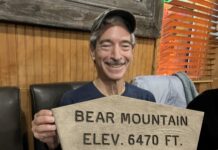The Sedona Fire District will soon be home to the second rapid response truck in Northern Arizona.
Currently, the only RRT is in Flagstaff for all of Northern Arizona, but SFD will receive Northern Arizona’s second RRT in October, thanks partly to a $120,000 grant from the U.S. Department of Homeland Security.
RRTs are used for all-risk hazard emergencies. They respond to rope, water, confined space and trench rescue calls, structure collapses, vehicle extrications and chemical, biological, radiological and nuclear spills and explosions, SFD engineer and paramedic Johnny Sedillo explained.
By Alison Ecklund
Larson Newspapers
The Sedona Fire District will soon be home to the second rapid response truck in Northern Arizona.
Currently, the only RRT is in Flagstaff for all of Northern Arizona, but SFD will receive Northern Arizona’s second RRT in October, thanks partly to a $120,000 grant from the U.S. Department of Homeland Security.
RRTs are used for all-risk hazard emergencies. They respond to rope, water, confined space and trench rescue calls, structure collapses, vehicle extrications and chemical, biological, radiological and nuclear spills and explosions, SFD engineer and paramedic Johnny Sedillo explained.
After the attacks of Sept. 11, 2001, Homeland Security started giving the grants, SFD Captain Patrick Ojeda said. Most grants went to metropolitan areas, where the risk was greater.
Central Arizona has 11 RRTs, even though the square mileage is less than Northern Arizona, which so far has had only one, Ojeda said.
“We don’t have a nuclear power plant like Phoenix. However, we have millions of tourists and a high-profile senator in the district,” he said, referring to presidential hopeful Sen. John McCain’s Cornville ranch.
The new RRT is one of SFD’s old trucks that was sent to Pennsylvania for retrofitting. Along with the $120,000 grant money, SFD chipped in $80,000 of its own, Assistant Chief Terry Keller said.
SFD is in the processes of applying for a grant for $97,570 for structural-collapse gear for the truck, Ojeda said.
By using creative funding, such as grants, SFD’s RRT will come at a lighter expense to taxpayers, while the entire area will benefit from it, he said.
The truck will respond to any high-risk emergencies in Yavapai and Coconino counties, and even as far away as Las Vegas, if needed, Sedillo said.
Along with all-risk hazard equipment, the truck will provide air for refilling firefighters’ self-contained air tanks.
It will also be equipped with a light tower to illuminate dark scenes, such as the site of a car accident at night, Keller said.
The truck won’t be the only thing prepared for all-risk hazard events.
SFD firefighters and other agencies in the Verde Valley train at the Verde Fire Training Center in Cottonwood to prepare for emergencies the truck will respond to.
Training includes components of structure collapse, such as breaching, breaking, cutting with torches, lifting and moving heavy objects and shoring — stabilizing walls or ceilings with lumber.
Firefighters also train in trench rescue, which is a likely scenario given the trenches at construction sites on Highways 179 and 260.
“Low-frequency, high-risk events,” Sedillo described what they train for. “If the day comes that we have to use this, we’ll be ready.”
All SFD firefighters must train once a year for confined-space operations, and they trench train every two years, for a couple of days at a time, Ojeda said.
Since all Verde Valley agencies participate in some type of training, the potential to call on each other is there.
“During an all-risk hazard event, all Verde Valley fire agencies have personnel trained in some level of technical rescue,” Ojeda said.
To help local agencies get high-quality training in all-risk hazard events, local businesses donate supplies, which benefits the whole community, Sedillo said.
Home Depot, Hansen’s Aggregate, Sedona and Cottonwood Lumbermens, the Arizona Department of Transportation and Foxworth Galbraith have donated supplies like concrete, lumber, nails and barriers to help firefighters train in special operations.
“We appreciate the support from the local businesses to better prepare us for disasters,” Sedillo said.
Alison Ecklund can be reached at 282-7795, Ext. 125, or e-mail aecklund@larsonnewspapers.com



















